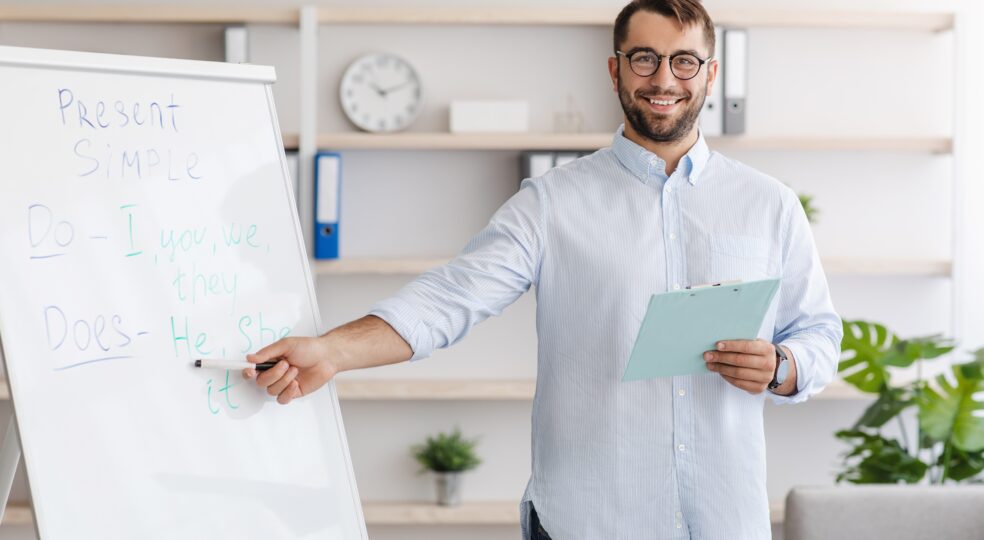
Advice makes sense in almost every situation in life. Basically, a helping hand that gives tips and teaches something is always worth a lot - and the same goes for learning. Are you wondering what exactly learning guidance is supposed to do? Would you like to find out how you can help learners and what exactly you should do as a learning consultant? You don't just want to provide mindless advice, you want to get the best out of your protégés? Then stay tuned, because we have all the answers for you!
Learning advice - at first it sounds like advice on learning, a kind of tutoring. But that's not quite true. But let's start from the beginning, namely with the term guidance. If we look at it pedagogically, we find various possible definitions. But basically it always refers to a conversation between a consultant and a person seeking advice about a certain issue. The purpose of this conversation is to find a way to solve problems or achieve certain goals. The counselor accompanies his or her protégé on this path.
If you want to train as a learning consultant yourself, you need one thing above all: a social streak. Of course, a large part of your work will involve interpersonal contact. You and your protégés are in close contact. You exchange ideas regularly to pave the way to the goal together. To this end, counseling skills are naturally also part of the list of necessary qualities.
But one thing is also very important: good conflict management skills. Of course, there will be times when your protégés come to the meeting with a short patience. They may also get a little frustrated at times because they don't know what to do. This is where your empathy is needed. The biggest mistake you can make is to let this upset you. Your job is to bring some order to the chaos in the learner's head. From this disorder, you join forces to create the path that leads to the goal. But this only works if you are communicative, not easily flustered and can always maintain an overview, no matter how mentally chaotic the situation seems at the time.

The journey is the destination. This is not just an empty phrase that is often used, but is actually true. Many learners - pupils and students - have the biggest problems in subjects or learning modules that are presented in a very dry manner. The mere recitation of facts and the mere presentation of information push learners straight to their destination and skip the path completely. Yet it is precisely this path that needs to be followed in order to be able to understand certain facts.
Think about it this way: you know what a car is, what it looks like and that it can transport you from A to B. But you may have no idea how it is built or how the fuel makes it run. But you may have no idea how it is built or how the fuel makes it go. You don't really need to know that either, at least not until you break down and want to drive on quickly or avoid having to spend horrendous sums of money in the garage. In these moments, you're glad that you not only know the big "end information", but that you've also gone a little deeper here and there.
In addition, knowledge that you have worked towards yourself is much easier to internalize. You work intensively on it, you have to really understand the subject matter in order to get to the "final information" and when you have done it, your mental reward system enjoys the success. This gives the learning process a more positive tone. And because of the longer period of time you are forced to spend on the subject, the information you have learned is more likely to make it into your long-term memory without you having to whisper it to yourself a million times in your mind.
Would you like to not only benefit from learning guidance yourself, but also help other learners to celebrate successes that they can be proud of? Then why not become a learning coach yourself! We will accompany you on your way to becoming a professional learning consultant.
Europe's leading memory trainer, Markus Hofmann, guides you through your memory training using fun and effective methods. Greator Learning Coach Training. You will then be able to release your children or other learners from the pressure to perform and take away their fears about the future.
Within three months, you will learn how to increase learner motivation and combine learning with fun. You will also learn how to overcome learning blocks. Reducing learning time is also an important part of the learning consultant training. In this way, learners gain more free time, which has a positive effect on their work-life balance.
Everyday life becomes more relaxed, because after university or school there is more than just studying and going to bed. You can spend more time with friends and family or simply have an evening to yourself. Because only those who have time to relax and do something for their soul can be successful in the long term.
The basic tenor of the lessons is instructive. If the teacher asks a question, they know the right answer themselves. This is different in learning guidance. Here it is not about teaching, but rather accompanying.
The learning guidance marks the way, so to speak, while the lessons are the plane ticket directly to the destination. It may sound practical at first to simply skip the journey. However, a great deal of learning is lost in the process and the sense of achievement of having reached the goal yourself is also lost.
To get the most out of your learning guidance, follow these 8 tips:
Coaching in learning counseling can significantly improve your learning experience by addressing your individual needs and learning styles. A coach will help you to identify and overcome learning blocks, set motivating goals and develop effective learning strategies. By encouraging self-reflection and personal responsibility, you will be empowered to actively shape your learning process and thus realize your full potential.
Learning guidance accompanies and advises you throughout the entire learning process. You will learn how to absorb new knowledge particularly well and retain it for a long time. It can even boost your self-confidence, as you will always experience a sense of achievement because you have acquired something yourself. And it is precisely this sense of achievement that is so important to give learning a positive tone.
Many parents take it for granted that their children will be able to ride a bike and swim by primary school age, for example, but unfortunately this is not common practice. Do you want to make a lasting improvement to children's lives? Do you want us to encourage our children in their abilities? That a "I can't do this!" in their head becomes a courageous "I can do this!" that the child feels in their heart?
However, a learning coach is by no means only suitable for children who come from socially disadvantaged backgrounds. They are also there for those who suffer from pressure at school or have difficulties understanding the learning material. In other words, this is less about health problems and more about mental deficits.
When working with them, it is particularly important to convey values to the kids. For example, the coach will focus on mindfulness, the child's strengths and weaknesses, or motivational work. As a team, coach and child will work out goals, set a focus and build or strengthen self-confidence with fun exercises.
The focus of the learning coach's work is to help children enjoy learning again. And finding out how your child can learn best. But also what the right environment for perfect learning should look like. Because that is individual for everyone.
Then register now for our training as a Learning Coach on. Our expert Markus Hofmann gives you the methods to start exactly there as a learning coach. He teaches you how to support your child or other children to go through school with a strong self-confidence and ease. With the right learning strategies, your child will learn that it doesn't have to be difficult to get good grades - and that learning can even be fun!
In your training as a learning coach, you will receive all the important background information, techniques and approaches within three months - with over 90 intensive videos - so that children can enjoy learning again and write good grades without any pressure!

